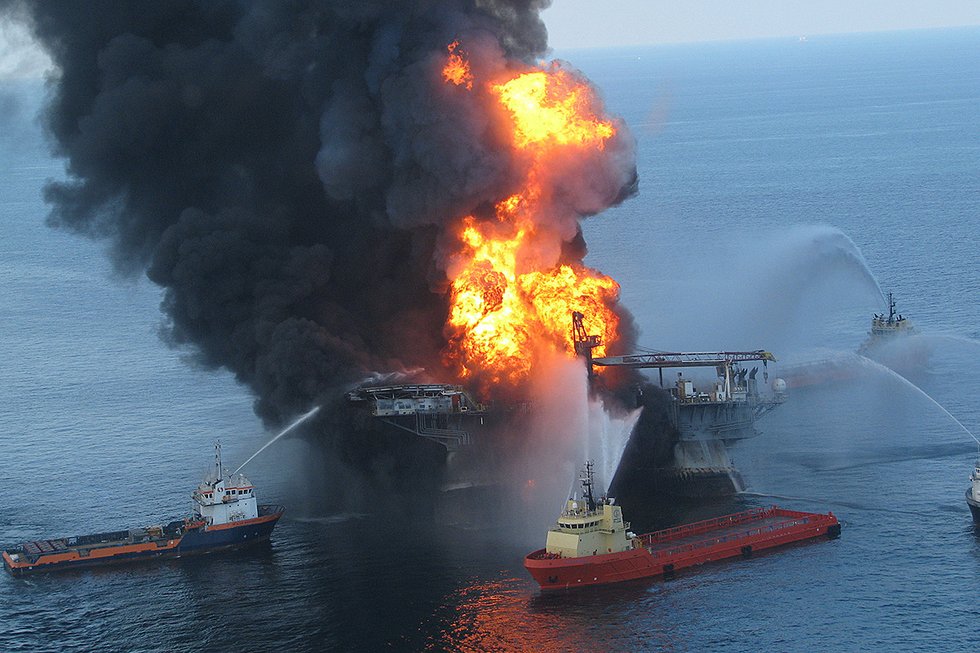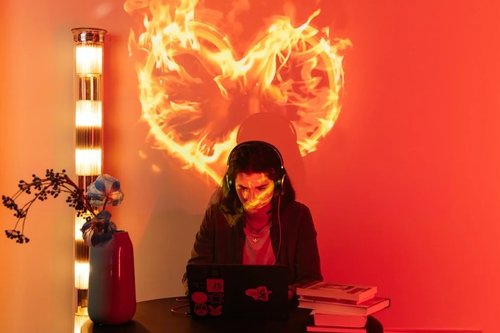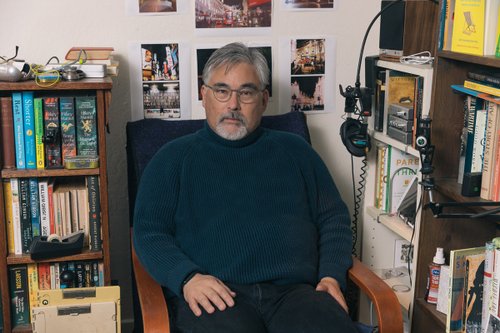‘I survived an oil rig explosion on my first job’
Dec 12, 2019
5 mins


Senior Editor - SOCIETY @ Welcome to the Jungle
This article was originally published in French in Welcome to the Jungle print magazine, published September 2019.
Whether they lasted only five minutes or several years, some moments in our professional lives leave an indelible impression.
Story by François-Xavier Mayer.
The hardest part was the smell of the gas. Dense, nauseating, almost solid, like a sudden weight pulling on the bottom of my lungs, on my shoulders, all over my body. Those who have ever breathed in hydrogen sulphide have this memory ingrained for ever. A smell of rotten eggs that would make your head explode. What’s worse is knowing that what you’re breathing in is poisoning you. Being in the middle of fire raging from the drills and unknown explosion sounds, that was what terrified me the most. Swallowing toxic gas that’s filling my lungs, losing the race to try to escape the oil rig where I had been working for two months. Stranded and alone, I had to jump into the water, the only place I would be able to breathe freely, in the pockets of air between the ocean and the gas cloud. In the distance, dozens of lifeboats, red buoys on a sea of oil, were moving further away without me.
Stranded and alone, I had to jump into the water, the only place I would be able to breathe freely, in the pockets of air between the ocean and the gas cloud.
It’s February 1997. I’m 24 years old and the camp leader of an offshore oil rig off the coast of Equatorial Guinea and Bioko Island. It’s my very first job. Hired on a long-term contract, I alternate between two intense months managing the lives of 200 company employees (food, lodging and activities) and two months back home, where all I do is carelessly burn through the cash from my indecent salary. I’ve just graduated from a hospitality management school, I’m young and I’ve decided to make the most of my life.
That morning, there was nothing to suggest the catastrophe lurking below us. I was in the kitchen, getting ready to pull off the big ceremony that was lunch—meals are an essential moment of the day when you’re cut off from the world—when at 11 am, the first alarm, the one signalling team assembly, went off on the loudspeakers. I wanted to turn off a few stoves but quickly alarm number two, which we had never heard before then, went off replacing the first one. More intense and rhythmic, this was the signal to get into the lifeboats. Muffled thuds started to shake the floor, ruling out the idea that this was simply a drill. In retrospect, I could have paid closer attention to certain signs: the increase in alerts in recent days, a noticeable level of tension among the bosses. We were exploring, digging into the seabed and trying to find our way to a pocket full of hydrocarbons, but apparently drilling was complicated in this new area. We were taking risks.
In retrospect, I could have paid closer attention to certain signs… We were taking risks.
“Risks.” For us it was just a word, one we heard repeatedly, over and over again. Even though we were trained, overtrained even, more than informed about what could happen to us on these kinds of rigs, all this remained very abstract after going through the same safety training for the hundredth time. It was a bit like the flight attendant safety demonstrations on planes. We would just go and smoke cigarettes until it was over.
When we arrived in front of the line of boats, no one really hesitated. Below us, in a whirlwind of salt water, the pocket of gas we had just pierced was spitting out huge rocks, hitting the rig and threatening its structural integrity. We all got into the boat that was assigned to us, each boss with their own team. It was only when I was on board, my shoulders in the metal hoops, that I realised one of my men was missing. Without a moment’s hesitation, the boss’s order was delivered: “Someone’s missing? You go!”
I never ran this fast in my life. Neither did I know who was missing—the teams changed every week—nor where to find them. I headed back to the restaurant, screaming in the middle of the inferno so I could be heard by the missing cook or waiter. My frantic running only lasted five minutes. The third alarm, the one indicating that the boats were being lowered into the water, went off. Too bad for the unknown missing guy. I took a tight turn and bolted off the other way to try to save my own skin and take my place in the inflatable boat. Too late. Thirty metres in front of me, the roof of my boat had closed my colleagues in. Click. Dropped into the water. Officially abandoned.
Thirty metres in front of me, the roof of my boat had closed my colleagues in. Click. Dropped into the water. Officially abandoned.
Strangely enough, I didn’t panic. I followed the procedure as if it had been written in my DNA. The succession of my thoughts was seamless, relentless: no more boats, so I had to find the lowest point on the rig to jump into the sea. My legs got me there, but I hesitated for a few seconds, suddenly fascinated by the spectacle going on around me. I even took the time to take a few pictures. I don’t really know why, I think I thought it would make for a great album. Then I jumped. Falling from a height of nearly 20 metres before hitting the water, which then activated my lifevest. Once again, I knew exactly what to do: let the current take me away from the rig, which might possibly collapse. Just a few metres away, rocks were rapidly coming up out of the water.
How long did I drift for? One or two hours, more? I managed to get away from those eruptions of stones. A bottle of drinking water on my shoulder, a light with a signal emitter giving off my position, I felt safe. I just took in the scene, a passive spectator witnessing a never-before-seen image.
As night fell, I fell asleep among the first stars at around 6pm. A nervous fatigue and hypothermia plunged me into a deep sleep. Without dreams. The next morning at dawn, the rescue team pulled me out of the water. My skin blue from the cold, a Mylar blanket on top of me and warm food on my lap, I remember seeing big smiles and getting slapped on the back. It was surreal. I had just flirted with certain death and my colleagues, maybe because they were American, seemed light years away from self-pity. The first thing they invited me to do? Hit the bar with them. In France, I would have most certainly been sent home and offered counselling. I accepted their invitation and took on the Guinean night, glasses of alcohol in hand. Alive.
My skin blue from the cold, a Mylar blanket on top of me and warm food on my lap, I remember seeing big smiles and getting slapped on the back.
The next day, the team leaders had to return to the rig, which was still standing, to clean up and recover certain objects and documents. An absurd day. I had spent hours trying to escape this place, and barely 24 hours later, I was back to shut down a kitchen in near-perfect condition… I worked this one last day, then I went home. The company offered me other jobs; I never accepted any of them.
More than 20 years later, it’s as if that day never existed. Like a nightmare from which the feelings are still strong, but the memories are fading, erased. I never saw any of the men who lived through that explosion with me again. I never spoke to anyone about what I lived through. All I know is that on that day, there were no deaths, and the man I had risked my life for had simply gone into another boat.
Translated by Kalin Linsberg
Follow Welcome to the Jungle on Facebook and subscribe to our newsletter to get your daily dose of our best articles.

More inspiration: Inspiration for workers

From hobby to side hustle: 10 steps to turn your passion into a career in 2025
Have you been waiting for the right moment to turn what you love into a paid gig? 2025 is your time!
Dec 18, 2024

Patience, balance, and multitasking: How parenthood shaped my career
Parenthood changes everything—including your career. These working parents share exactly how.
Dec 11, 2024

The traits of a great boss (and how they make your work life better)
What makes a great boss? Effective leaders do more than manage tasks—they create a workplace where people feel supported, encouraged, and inspired.
Nov 13, 2024

Leading without limits: How to shine as a leader, title or no title
Lab expert Ginny Clarke explores how being a leader isn't just reserved for execs ...
Apr 09, 2024

How our burnt-out society can finally get some rest
Alex Soojung-Kim Pang unveils transformative strategies for slowing down our fast-paced lives.
Mar 19, 2024
The newsletter that does the job
Want to keep up with the latest articles? Twice a week you can receive stories, jobs, and tips in your inbox.

Looking for your next job?
Over 200,000 people have found a job with Welcome to the Jungle.
Explore jobs